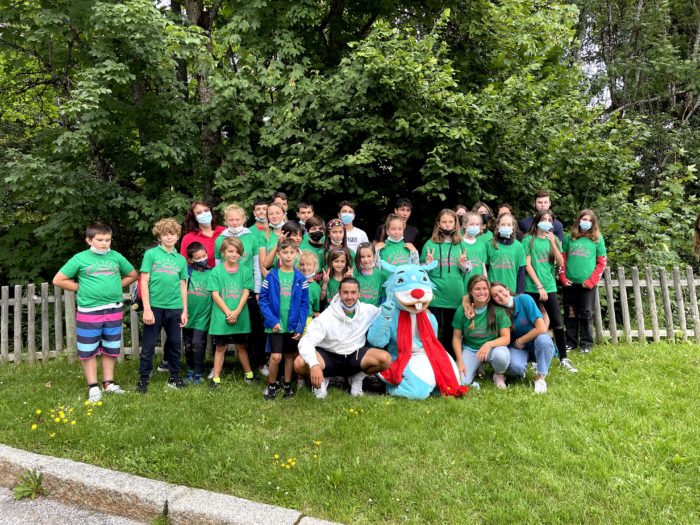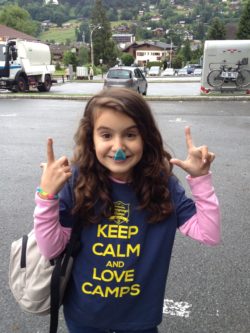Tag: sleepover camp
The 14 most asked questions about camps
1. What is camp?
Camp, as a concept, can be a very difficult thing to define.
Each camp is developed to provide a unique experience for children and teens of different backgrounds, skill sets and interests. They offer new experiences, activities, and friendships, and promote personal development.
Fun is part of it, as is challenge. Some of the challenges are physical, others social. While camp is strongly associated with the summer season—something that is due to the fact that the camp concept began as a summer program for young people—today’s camp sessions are offered throughout the course of the year. You can have a look at our winter camps!
What the best camps share is their ability to provide opportunities for kids to grow around a set of common interests and abilities, and to gain a sense of their talents within a setting of shared values. Peer mentorship often takes a front seat in the camp experience, with young people working to gain the trust of others. Success is not exclusively personal, but also social. It is less about “I did it!” and more about “we did it!”
Whether it is a day camp or an overnight camp, it is an opportunity for kids to explore being active in creative ways that appeal to who they are and in ways that are kid-driven, rather than adult-driven. They provide stimulating, purposeful play while encouraging creativity and social engagement. When at camp, kids learn to set their own boundaries, to develop in an environment that is not necessarily focused on a competitive end, to interact with one another, and to be involved in an active way with their peers.
2. Is summer camp worth the investment?
Camp offers adventure, personal growth challenges, and social opportunities that belie any dollar figure attached to the experience. Many campers do not appreciate the true value of camp until some point in the future when a lesson in decisiveness, grit, or persistence becomes truly apparent. For others, camp presents experiences, and affords personal revelations that are immediately invaluable. The stories of camp alumni’s enthusiasm implies that yes, it is worth it, and no, you can’t put a price on what you gain.
Take a fuller look at how summer camp is worth it
3. What’s So Great About Camp?
We have a lot of testimonials of old campers who say that they met their best friends for life in summer camps because when you are at camp, you meet people who get to know you better than anyone from school, and you build strong relationships with the people who make you the happiest. The amazing thing about camp is that the people and the environment really open you up to be who you are and make you feel accepted and loved for it. Leaving camp always comes with a lot of tears because it has such an amazing impact on people.
4. How Long Does Summer Camp Last?
Most of the campers enrol for 2-3 weeks. Some parents prefer a week or two, specially for the younger campers. For older campers, parents choose longer sessions up to a 5 week program. But, again, it is a good question, one that you should think about whenever considering a program: how long are the sessions?
5. What’s the Difference Between Day and Overnight?
At overnight camps, kids arrive and stay on site, in groups of similar age, each presided over by counsellors who live with them. They may experience homesickness, though, even then, the counsellors know how to support the child, and by the end of the session, they will have a sense of having tackled even that challenge successfully.
At day camps, campers only attend during the day: they arrive in the morning and go home at night. Day campers are able to focus more intensively on a specific passion along with peers who share that passion, mentored by counsellors who are experts in their respective fields.
6. What do Specialty Camps Offer?
All great camps share those attributes: getting kids out of their comfort zones, placing them in settings in which their personal interests and talents are valued.
We believe sincerely in the educational, social and recreational values of each camp.Our programs are specialised in languages and sports. Children come from all over the world to learn French or English and practise different sports .
7. How do I know if my child is ready for overnight camp?
We accept kids at six years of age, though not all children are ready at that age to spend a week or more away from home and family.
There are factors to consider when deciding if your child is ready for the overnight experience.
The comfort with the concept. Is your child comfortable having sleepovers? You can set up sleepovers and see how the child reacts. If your child is still nervous or uncomfortable with the prospect of spending the night away from home, overnight camp probably isn’t in the cards just yet.
And then, factor is: does your child want to go? Gauge their interest in the various options, and let them get a feel for what this particular camp is all about. If kids are involved in the process, and are excited at what they will be doing at camp, they’ll be much more comfortable when they get there.
And, yes, parents tend to be overly cautious. Most children are much more ready to go to camp than their parents are to let them go. Kids are typically ready for day or overnight camp when they start to get involved in activities outside the home—playing hockey or basketball, or starting to generate interests away from the family.
8.Is Camp Safe?
A US national study conducted at camps showed that rates of injury through camp experience were significantly lower than those of most organized sports.
Addressing everything from physical safety to emotional well-being, a good director is committed to ensuring each child has a positive camp experience. These days there is a greater focus on anxiety and nervousness. Open communication is often the best solution, and it starts by letting parents and campers know exactly what to expect, as every camp director does. Any concern that’s top of mind for parents is also top of mind for camp directors.Camps conduct criminal record checks for all new staff members.
When our kids take part in canoeing, kayaking, climbing, or swimming, they’re supervised by staff who are certified in those areas.
Further, camps are required to have strict, well-enforced policies around food cleanliness and safety, allergies and dietary needs, water purification, camper health and wellness, medical services, and program safety.
Peace of mind should be part of the overall camp experience as well, and if you don’t have it, then feel free to approach the camp staff or administration. Truly, they’ll be happy you asked.
Camps, as with any professional environment, have a typical and clear administrative hierarchy. At the top are the camp directors, who are people for whom camping is both a full-time career as well as a personal passion. Most directors have extensive experience at camp, having grown up through the camp experience themselves. Many have academic credentials. Others have a background in outdoor recreation.
As with principals within a school environment, directors set the tone at camp. Everything that happens on the camp property is their responsibility. Their prime concern is the safety, health, and happiness of the campers. Before delegating this responsibility, they must hire mature, experienced, skilled, and competent individuals and then train them fully in all aspects of safety and risk management. Throughout the season, they support, supervise, and evaluate staff to ensure the well-being of every individual on the camp property.
9. Will the proposed activities really be useful to them?
In all camps, traditional or innovative, activities/events/ facilities don’t exist for themselves, or even necessarily to promote the skill sets they seem to represent. Isn’t looking forward to a career in making friendship bracelets. Even the sports, at least outside of specialty camps, aren’t conducted with the elite athlete in mind. Instead, as camp directors will tell you, the programming is a tool used to get to the hearts and minds of the kids, to help them to grow together, develop, and gain confidence in who they are and what they can do. From public speaking programs to sailing the high seas on a tall ship, it’s not the activity so much as what is done with it and what it is employed to accomplish. Foremost is to give young people a place where they can share their passions and knowledge, where they will feel a unique sense of belonging. Once they acclimate and get used to the idea.
10. How Do I Make Friends at Camp?
 It is a common question that is not voiced as often as it’s felt. Going to camp for the first time can require a bit of courage, and kids can be anxious about an upcoming camp experience. If a young person were to ask, this is what we’d say:
It is a common question that is not voiced as often as it’s felt. Going to camp for the first time can require a bit of courage, and kids can be anxious about an upcoming camp experience. If a young person were to ask, this is what we’d say:
- Everyone is in the same boat. The other campers are as anxious about fitting in as you are.
- say hi. Everyone has a bit of trouble putting themselves out there. If you say hi, whoever you say it to will be very happy you did.
- be yourself. Yes, this is what everyone says. But they say it because it’s true. Just be who you are, rather than trying to be what you think other people are looking for. They want to know you, and to know that you’re interested in knowing them.
- listen as much as you talk. Put yourself forward, but then let other people put themselves forward, too.
- go with the flow. There are lots of new experiences. Give everything a try. If you don’t like it, well, then you’ll know.
- have fun. Know that as difficult or strange as the first day might be, you are actually going to have fun. You’ll probably even cry when camp ends.
11. What’s A Typical Day at Camp Like?
The morning is dedicated to the language lessons and some games between the work times. In the afternoon, we organise a lot of activities such swimming , a big game, ice skating and many others. The list can be very long! After this fun time, campers do some others little activities, maybe an extra activity that you had taken for your child. It can be a tennis lesson or an individual language lesson (we teach 10 different languages). Lunch is at the restaurant, and they really appreciate to be served delicious french cuisine. Evening parties are organised by counsellors or professionals.
12. How Do I Register?
These days the registration process is quite simple. You can register and pay online. Keep in mind the registration timeline, though. You can register right up until the time camp starts but since some camps fill up fast, you’ll want to stay on top of things.
The cost of an overnight camp session is higher than a day camp session of similar duration, given the costs associated with accommodation and meals.
Our camp fees include:
- Access to the camp’s facilities
- Accommodation
- Supervision by trained staff members
There may be extra services, which are not included in the price:
- Optional programs and activities
- Supplies
- Equipment
- Camp merchandise, clothes, and snacks, which may be available at tuck shops
13. What Should I Be Asking The Camp Director?
You should absolutely approach the camp director, if only because they are great people, and any interaction will be welcome and illuminating. No question is foolish or too direct when you are dealing with the well-being and safety of your child.
What are your qualifications and experience?
Without exception, you’ll be impressed by the experience that they bring to the role. That said, pay as much attention to how they respond as to what they say. This is the person you will need to trust most with the care of your child. They should present themselves with confidence, professionalism, and empathy. Most do that and more.
What written policies are practised at camp to ensure camper safety?
In pre-camp training, staff learn the written safety guidelines for every activity and program and practise the emergency procedures for fire, waterfront emergency, severe weather, or a missing camper.
What will you do on the first day to make my child feel like they have an important place at camp?
Those first moments are crucial to a camper’s enjoyment of camp. The best case is one in which campers begin immediately: playing games and learning each other’s names.
What do you love about your camp?
Whatever camp directors say should match with your values as a family. Their experience and enthusiasm for working with young people should shine as well. If not, keep looking.

 It is a common question that is not voiced as often as it’s felt. Going to camp for the first time can require a bit of courage, and kids can be anxious about an upcoming camp experience. If a young person were to ask, this is what we’d say:
It is a common question that is not voiced as often as it’s felt. Going to camp for the first time can require a bit of courage, and kids can be anxious about an upcoming camp experience. If a young person were to ask, this is what we’d say:


